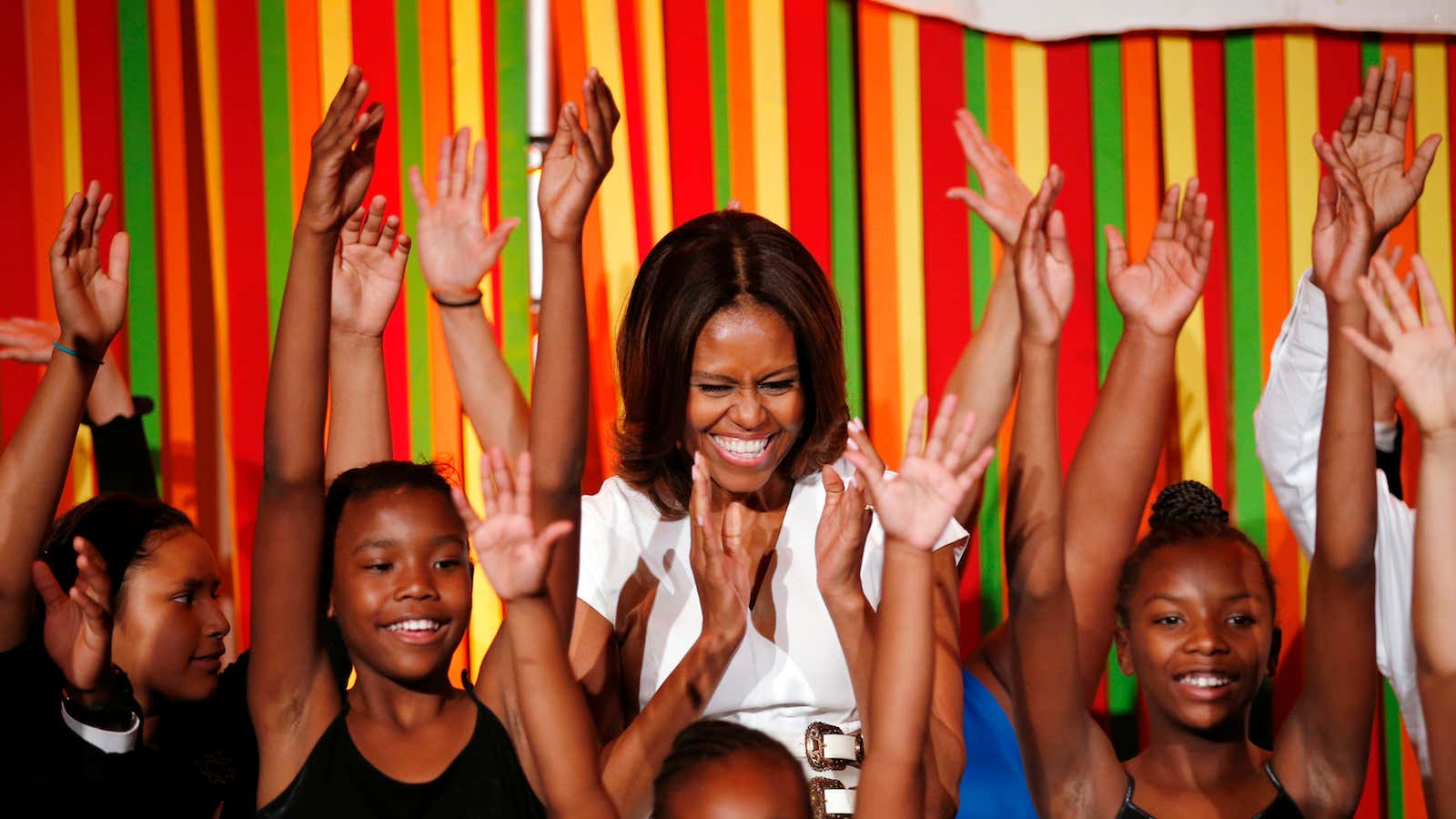Still in her early 50s, Michelle Obama has a lot of career left in her. But while many former first ladies in the US have pursued philanthropy after leaving the White House, Michelle’s strong understanding of pop culture suggests she could have an even more dramatic impact as the head of a movie studio or a TV network.
Although many takes on the first lady’s legacy have focused on her advocacy for healthy eating and her flair for fashion, what was most unique about her time in Washington was how she brought creativity into the White House. She took a role that for generations was about being seen and not heard and used her voice to amplify the issues she cared about in fun and creative ways. As first lady, she spoofed Lil’ John and DJ Snake in a viral video about healthy eating called “Turnip for What?”, rapped about the importance of going to college with Saturday Night Live alum Jay Pharoah, and produced a single with Missy Elliot that supported her Let Girls Learn education initiative.
Not only did Michelle demonstrate a love for the arts, she showed she has business acumen, too. While she is more famous for having flawlessly sung Stevie Wonder’s “Signed, Sealed, Delivered” while doing carpool karaoke with James Corden, she also revealed a producer’s savvy in bringing together creative people in interesting and powerful ways. Some of these included the White House Poetry Jam, wherein the world got its first glimpse of Lin-Manuel Miranda’s Hamilton, and the White House Celebrates Memphis Soul event, which featured artists such as Mavis Staples, Cyndi Lauper, and the Alabama Shakes.
For eight years, everything Michelle Obama has dared to do has been the definition of “must-see TV.” So what better person to delve into the world of entertainment?
As a female, African-American entertainment executive in a field dominated by white men, Michelle would be the perfect candidate to solve the diversity and sexism issues that run rampant in the film, music, and art industries. For example, award-winning director Ava Duvernay has recently become the first woman of color to helm a $100 million dollar film with her upcoming adaptation of A Wrinkle In Time. But Duvernay came to this success the hard way. “You could make the most beautiful film, and that weekend it’s raining too hard on the East Coast, and no one goes out,” she says. “Artists should have a chance to do it again. That’s the challenge: Women artists don’t get a second chance. People-of-color artists don’t get a second chance. You’re put in director’s jail, and that’s a wrap.”
How many more Ava Duvernays would get to engage in creative storytelling if more women like Michelle Obama had the power to greenlight a movie or order a pilot to production? Michelle would be able to use her experience as a lawyer and tastemaker to create culture that would shape our time and last for generations.
Public-facing artists would also trust Michelle’s insight and judgment into their careers, because she too has lived in the spotlight on the most public of all stages. Michelle initially seemed to be a reluctant first lady, but she embraced the job with increasing confidence, showing sides of her personality as few of her predecessors have dared to do.
As Brene Brown writes in Daring Greatly, “Courage starts with showing up and letting ourselves be seen.” Michelle did this not only in her life as a public servant, but also in the realm of entertainment, where she was never afraid to make fun of herself and show vulnerability. Who else would have shared a stage with Jimmy Fallon, dressed up in cardigans and performing a skit called the “Evolution of Mom Dancing,” jokingly bopping along to such faux suburban-Mom moves as “Driving the Station Wagon” and “Just the Hands Part of the Single Ladies Dance”?
As a sense of despair sets in for many Americans, Michelle’s role as an entertainment executive would be especially powerful in the years ahead. As writer Toni Morrison famously said, “This is precisely the time when artists go to work—not when everything is fine, but in times of dread. That’s our job!” As the head of a major creative company, Michelle would help artists do their most important job: Imagining what does not yet exist, and making it come to life in a way that feels utterly real and possible.
